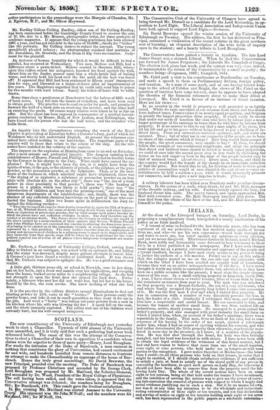SCOTLAND.
The new constituency, of the University of Edinburgh met yesterday week to elect a Chancellor. Upwards of 1000 alumni of the University were assembled, and it is truly said that such a gathering had never been witnessed before. The cause of this was the attempt of the Conserva- tives to elect a Chancellor of their own in opposition to a candidate whose claims were far superior to those of mere party—Henry, Lord Brougham. For weeks the intrusion of the Duke of Buceleuch, a man eminent in nothing that constitutes the glory of Universities, had caused excitement far and wide, and hundreds travelled from remote distances to frustrate an attempt to make the Chancellorship an appanage of the house of Buo- °Leitch. Hence the truly great assemblage. Sir David Brewster, the new Principal, presided over the meeting. The Duke of Buccleuch was proposed by Professor Christison and seconded by Sir George Clerk. Lord Brougham was proposed by Mr. Maitland, the Solicitor-General, and seconded by Dr. Wood, President of the Royal College of Physicians. The roll having been called, and the votes taken, it appeared that the Cons ative attempt was defeated ; the numbers being for Brougham, 655; or Buceleuch 419. This result gave the liveliest satisfaction.
In e evening Mr. Maitland was elected Assessor to the University Cou His opponent was Sir John M'Neill ; and the numbers were for Mai d, 282 ; for M'Neill, 194. The Conservative Club of the University of Glasgow have agreed to bring forward Mr. Disraeli as a candidate for the Lord Rectorship, in op- position to Lord Elgin. The Liberal Association and Independent Union have both agreed to support Lord Elgin.—Seotsalan.
Sir David Brewster opened the winter session of the University of Edinburgh on Tuesday. His address, the first he has delivered as Prin- cipal, contained a vindication of the recent reforms in the great northern seat of learning ; an eloquent description of the wide fields of inquiry open to the student ; and a hearty tribute to Lord Brougham.
The Conservatives have gained a victory in Ayrshire. The late Lord James Stuart was a staunch Liberal. When he died tho Conservatives put forward Sir James Fergusson ; the Liberals Mr. Campbell of Cragie. The election took place last week, and the contest was very close indeed. It terminated in the return of the Conservative by a small majority ; the numbers being—Fergusson, 1687; Campbell, 1641.
Mr. Caird paid a visit to his constituents at Dunfermline on Tuesday, and made a speech to them on Parliamentary Reform, foreign policy, and taxation. As a man of some mark, and as one having known lean- ings to the school of Cobden and Bright, the views of Mr. Caird on the question of taxation have some interest, since he appears to have adopted the theories of the financial reformers about to make their debut at Liverpool. Mr. Caird is in favour of an increase of direct taxation. Here are his views :- In no country in the world is property so well protected or so lightly taxed. While we raise one-third of our revenue from direct and taro-thirds from indirect taxes, France raises it in nearly equal proportion, and Belgium in greatly the largest proportion from property. It could easily be shown that under our mode of taxation the man who lives by labour pays a much larger percentage of his earnings in taxes than he who lives by income front property. It is no answer to this to say that a man might, if he chose, live all his life and go to his grave without being forced to pay a farthing of in- direct taxes. Flour and oatmeal are untaxed—potatoes, salt, and water are untaxed. True ; but of what use is our commerce if the people are to have no share of the comforts which it brings ? How long would trade prosper if the people, the great consumers, were unable to buy ? If, then, we should follow the example of our continental neighbours, and adopt the principle that direct and indirect taxes should be levied in nearly equal proportions, we could at once take the second great step in free trade by abolishing the duties on tea and sugar—a boon to the mass of the people iuferior only to that of untaxed bread. (Loud cheers.) Every man, woman, and child is the country would feel the benefit of the change in an immediate reduction of half the price. Nor would this be all, for freedom of trade in these great articles of consumption would at once diminish the cost of our revenue es- tablishments by half a million a year, while it would immensely promote our commerce, and thus give a new impetus to trade. (Cheers.)
A railway labourer has been killed near Banchory under peculiar circum- stances. In the course of a walk, when drunk, he met Mr. Hall, manager- of the Deeside railway, and his wife. Pushing rudely against the lady, her husband thrust him aside. The navvy turned, and again approached Mrs. Hall with extended arms. Mr. Hall thereupon knocked him down. The man died from the effects of the blow or the fall, and Mr. Hall has reported himself to the police.


























 Previous page
Previous page